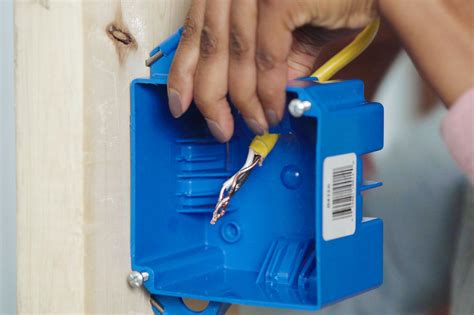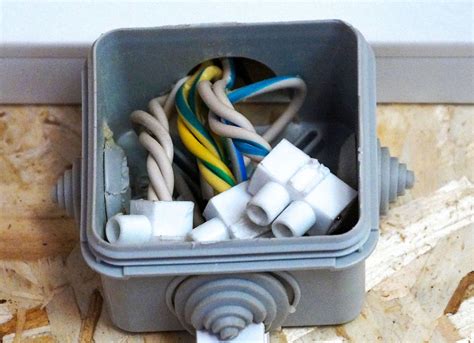is it better to use plastic or metal electric boxes 15 amps: A cable labeled "14-2 with ground" will have two insulated conductors with . Box junctions. These have criss-cross yellow lines painted on the road (see ‘Road markings‘). You MUST NOT enter the box until your exit road or lane is clear. However, you may enter the box and wait when you want to turn right, and are only stopped from doing so by oncoming traffic, or by other vehicles waiting to turn right.
0 · wiring plastic electrical box knockouts
1 · plastic vs metal junction box
2 · plastic outlet box vs metal
3 · plastic masonry electrical box
4 · plastic junction boxes electrical lowe's
5 · plastic electrical outlet boxes types
6 · metal vs plastic gang box
7 · installing a plastic electrical box
The U-LI Group specialises in the production of cable support systems to meet the support requirements of electrical cables and wiring network in buildings and structures. Cable support systems are safe, dependable and the most cost effective .
wiring plastic electrical box knockouts
Strong, fireproof, and incapable of melting, metal boxes offer the greatest level of security for all electrical wiring applications. Compared to plastic boxes, metal electrical boxes are very strong: It is virtually impossible to bend, warp, twist, or crush metal electrical or junction .15 amps: A cable labeled "14-2 with ground" will have two insulated conductors with .
This casing needs to be attached to metal boxes. NM cable's vinyl sheathing .
basics steel security safe lock box
It also prevents the cable from rubbing against the edge of the box and .Yes, it is perfectly fine to use plastic electrical boxes. In fact, most homes these days are built with plastic electrical boxes. However, if you are working with higher voltage circuits, it is generally . Metal and plastic are the most common materials used to construct electrical boxes. Metal boxes are primarily made from steel, aluminum, or cast iron, while non-metallic boxes . Plastic boxes are lightweight, easy to work with, and suitable for non-metallic cables. They are a popular choice for DIYers. On the other hand, .
Plastic vs. Metal Electrical Boxes: Choosing the Right One for Your Project. Understanding Electrical Boxes. Electrical boxes are essential components of any electrical . 12K. 748K views 11 months ago. All My Favorite DIY Electrical Tools - https://www.amazon.com/shop/everydayh. Do you feel comfortable using metal electrical .
Use plastic boxes when: There are non-metallic (NM) cables leading in or out of the box. Metal-sheathed wiring relies on bonding with the metal electric box for grounding and should not be used in plastic boxes. .Technical knowledge. Comparing Metal and Plastic Enclosures for Electrical Use. When it comes to electrical installations, choosing the right type of enclosure is crucial for safety and .
In many cases, your choice of a metal or plastic electrical box is one of personal preference, economy, and ease. In a few cases, though, the choice is clear-cut and obvious, mainly with respect to grounding. Though PVC can melt when overheated, it does not conduct electricity like metal does. Use plastic boxes when: There are non-metallic (NM) cables leading in or out of the box. Metal-sheathed wiring relies on bonding .There are a few key differences between metal and plastic electrical boxes. Metal boxes are generally more durable than plastic boxes, and they offer better protection against fire. Metal boxes also tend to be more expensive than . Okay, if we're using boxes for actual reasons, then every single reason to use a box is better served by a metal box. Plastic boxes are designed to install 10 seconds faster - which only benefits builders.
Metal is not necessiraly for commercial use, it was used for both until fairly recently when first fiberglass, then plastic or rubber took over the residential area, because they are cheaper to purchase and less labor intensive to . Metal boxes must be grounded whether exposed or not (and regardless of the type of covers). You can use plastic covers on metal boxes. Metal covers require that you use a proper method to ground them as well. Typically being screwed to a grounded metal box or a grounded device (receptacle/switch) suffices.
When it comes to electrical installations, the choice between a metal or plastic junction box depends on the unique requirements of your project. Plastic boxes are cost-effective and lightweight. They are widely used for standard residential and low-voltage applications. Metal boxes are durable, fire-resistant, and good for grounding. They are used in demanding .
Electrical Trade Topics. Residential Electrical Forum Fiberglass vs. Plastic boxes . However, with all the shortages and whatnot now, they seem to be in better supply than I remember. What are the benefits of using fiberglass boxes instead of plastic? They definitely can’t handle an accidental hammer swing as well as a plastic box can.
If you need a bigger gang box than metal provides, try a masonary box, works great if you have big dimmers. I believe metal boxes tend to work better for retrofit installations, and plastic are better for new construction, since they come with vapor barriers attached. The code have no preference for one or the other however. In most cases, metal is the better material for electrical enclosures. 🞹 When Not to Choose a Metal Box. The non-metallic encased wire is what you’re employing here. While plastic junction boxes and Romex wire go hand in hand, metal enclosures are also a viable option. . Use plastic or metal boxes with equal confidence if you’re . Master Electrician Electric Contractor Richmond VA. Location Henrico County, VA Occupation Electrical Contractor Apr 21, 2010 #8 mcclary's electrical said: . I've been guilty in the past of using a metal cover on a plastic box also. Won't happen again unless it is bonded. P. Philip Barr Member. Location Minneola Florida. Apr 22, 2010 #19 This video presents the pros and cons of plastic vs. metal electrical boxes. And I show how I've used all metal boxes with plaster rings in my home addition.

This comprehensive guide will examine when it is best to use a plastic electrical box versus a metal one. Introduction. Electrical boxes, also known as junction boxes, are containers used to connect and house electrical wires and devices. . Heat Tolerance – Metal dissipates heat better than plastic which can droop or melt. Impact Protection . BOYI offers premium sheet metal fabrication and plastic injection molding services to provide you with top-notch metal and plastic electrical boxes. Whether you need robust metal boxes for commercial applications or versatile plastic boxes for residential use, BOYI has the perfect solution tailored to your needs. I don't believe electrical code will allow the use of plastic boxes for ceiling lights. I believe they must all be "fan" rated. Plastic outlet boxes: Use care when tightening the screws that hold the outlet or switch in. They crack or strip fairly easily. They are much quicker to wire since their is no pinch bolt/strain relief to mess with.
Only reasons I use metal in residential are, existing MC or BX cable, I need a custom size shape not readily available in plastic, it's all i have with me. Metal boxes are compatible with metal clad wires. Metal boxes have better shallow options and can easily be combined to make multigang options not available in plastic. Plastic boxes are . The OP is talking about using copper caterpillars, which is #14 or #12 solid copper wire, wound around a phillips screwdriver shaft. You nip off the length you need to serve as a spacer on the device screw. Versus the little square plastic click together spacer washers you can buy as premade device shims. Neither are listed box extensions.
Plastic is cheaper and probably more easier to work with (don’t need to ground the box), but it flexes more - if it’s for myself I’d probably use the metal and make sure it gets solidly mounted so that it doesn’t flex when you insert/unplug cables - but also like others have said, use single or double gang boxes, not these octagon boxesPlastic can melt faster and spread flame faster in a fire scenario. I'm kinda surprised that plastic boxes are a thing. I have seen them in home depot and stuff but it seems 98% metal boxes there. Are they used a lot in resi? I guess code doesn't say you CAN'T use them so people must. Never seen one in commercial.
I've been using plastic adjustable electrical boxes, like the type shown above. The advantage is that is allows for easy adjustability when using a really thick wall (ex: double drywall, triple dryall, clips, channels, etc). . What are you guys using for electrical boxes? Are the metal ones any better in regards to stiffness or soundproofing . Or I can mount it in a different way; the question is, will this pass code ? I'd just cut off the nailing ears, insert the box through the existing drywall hole, and attach it using a screw (or two) through the sides of the box into the stud. I'm thinking maybe the problem would be the metal screw head inside the plastic box.
Be sure to use grommets in studs where you pass wires through if you are using Romex cable. As for boxes they make metal 4x4 boxes for this with a flange to screw into face of metal stud. An alternative is to screw a 18" long 2x4 to std where you want box and then use any box you like screwing it into the wood.
It is mandatory to use a metal electrical box when a metal conduit or metal-sheathed cable runs in and out of the box. Another situation where it is better to choose a metal electrical box is for interior exposed applications, including conduits in unfinished basements and mudrooms with incomplete drywall systems. Plastic may be allowed by code but that does not apply in this situation. If the engineer specified metal boxes there is a reason for it. Most likely metal boxes are more durable and the screw holes for mounting the device will stand up better overtime. best advice i can give is ask the question. Can plastic boxes be used in lieu of metal boxes? Figure no 3 Plastic junction box. 2) Durability and Longevity: Metal junction box vs plastic Metal Junction Box: Metal junction boxes are more long-lasting as they have high melting points ( from 660°C to 1,538°C ) and are stronger than plastic boxes so, they can be used long-term.; Plastic Junction Box: Plastic junction boxes are not so sturdy, so not suitable for outside . You cannot use metal covers on plastic boxes unless the cover is bonded in some fashion. Some of the round plastic boxes will have a ground screw connected to a metal sleeve for one of the screw mounting holes for this reason. They do make round plastic covers. _____

bathroom sconce electrical box
Let‘s go over some common questions folks have about working with PVC and metal electrical boxes and conduit: Can you mix plastic and metal boxes? Absolutely! You just need to: Ensure boxes are compatible ; Use proper clamps, screws, outlets/switches for each box type ; Ground the metal box; Use a ground screw on the plastic box
Metal is Fireproof and Better for High-Temperature Areas: Metal boxes won’t melt or catch fire, making them the safer choice in high-temperature environments or places with a fire risk. Plastic Can Melt in Extreme Heat : Plastic boxes aren’t fireproof.
Check out our metal u shaped brackets selection for the very best in unique or custom, handmade pieces from our shelving brackets shops.
is it better to use plastic or metal electric boxes|plastic outlet box vs metal